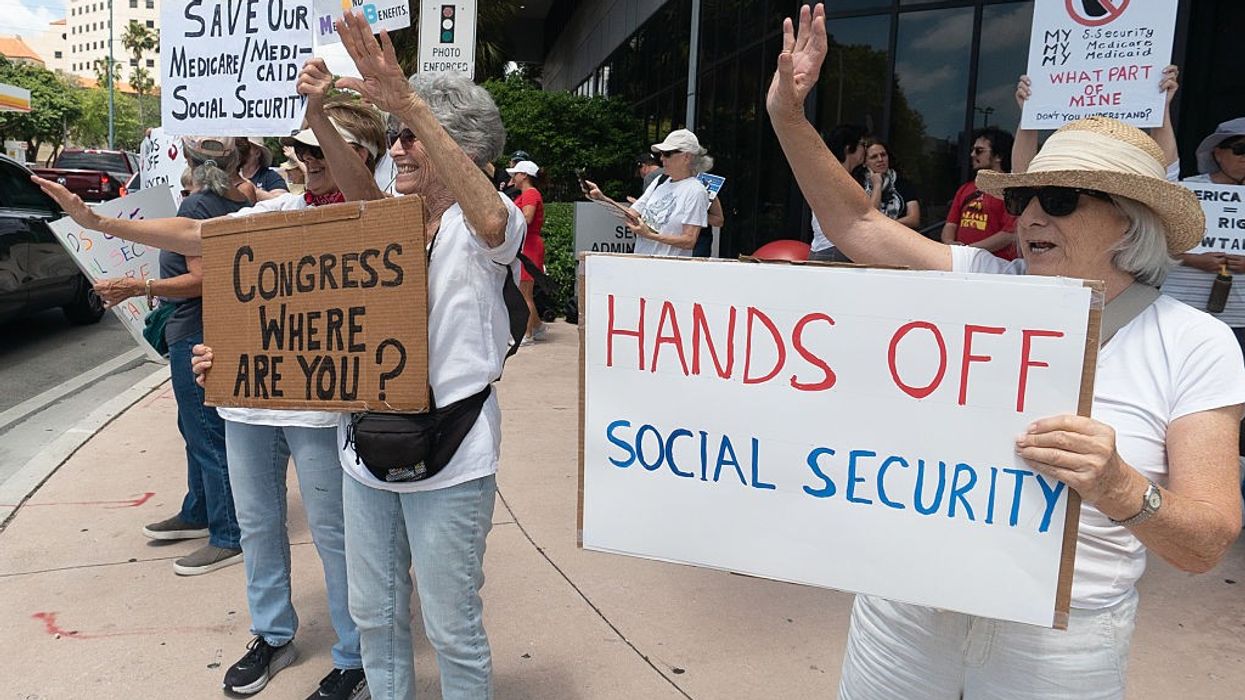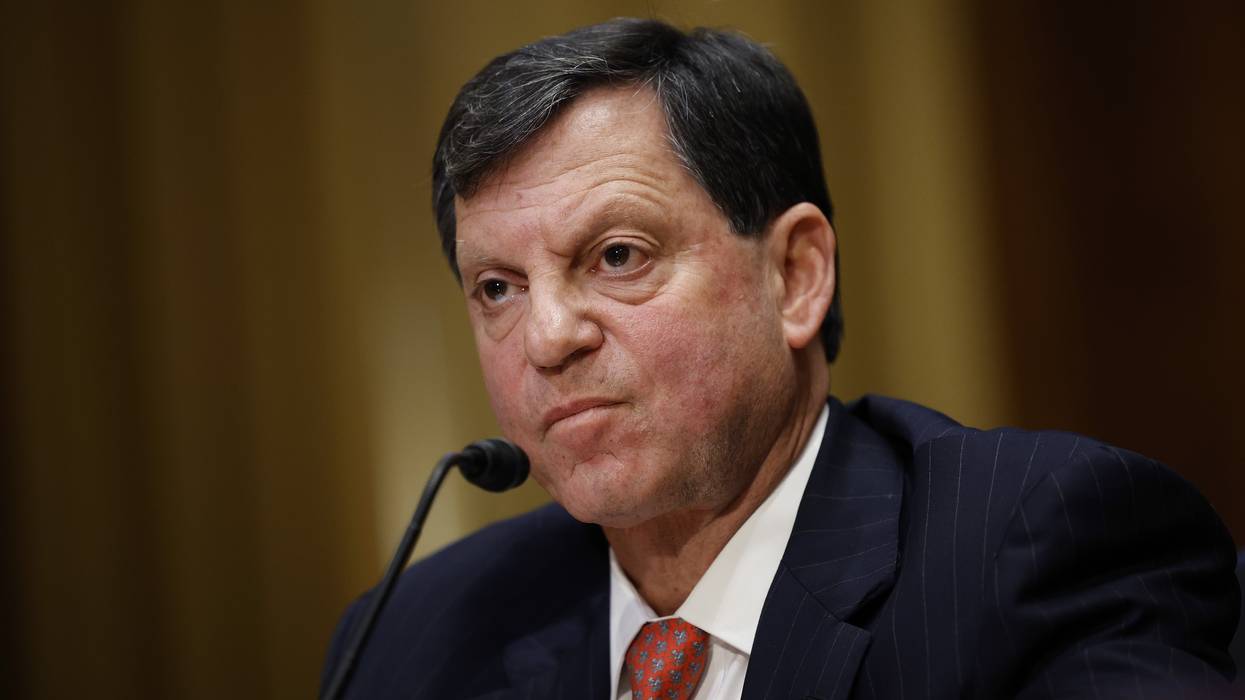Trump Is Out to Destroy the 'Meaning of Social Security'—in More Ways Than One
Trump spent 2025 doing everything in his power to demolish our invaluable Social Security system itself.
The walls of the Wilbur J. Cohen Federal Building, which lies blocks from the US Capitol, are decorated with stunning New Deal-era murals. The most famous of these murals, "The Meaning of Social Security," depicts life before and after Social Security. The mural shows the best of America, what we can do when we all come together to build our Social Security system. Thanks to Donald Trump, "The Meaning of Social Security"—along with everything it represents—is now in grave danger.
The Trump administration is making moves to demolish the Wilbur J. Cohen Building, inevitably destroying "The Meaning of Social Security" in the process. Trump plans to take a wrecking ball to this key piece of Social Security’s history, just as he did to the east wing of the White House. But this is about more than just a mural. Trump spent 2025 doing everything in his power to demolish our invaluable Social Security system itself.
Trump ran on a promise to protect Social Security. Not surprisingly given his past history, he betrayed that promise over and over again in 2025.
Notably, Trump chose Russell Vought to be his powerful head of the Office of Management and Budget. Vought, the lead architect of Project 2025, made the Trump administration’s agenda plain, infamously declaring: “We want the bureaucrats to be traumatically affected. When they wake up in the morning, we want them to not want to go to work…”
The very sense of security that lifted us out of the Great Depression is what Trump is destroying—and he wants to erase the memory that another way is possible.
True to that goal, Trump and Vought gave Elon Musk’s Department of Government Efficiency (DOGE) unprecedented power over the federal government, including Social Security. Musk and his underlings used that power to:
- Force out thousands of the dedicated civil servants who run Social Security, disproportionately those with the most experience and institutional knowledge. That despite the fact that the Social Security Administration was already extremely understaffed and overburdened, with 12,000 Americans turning age 65 every day.
- Copy the American people’s most personal data to an insecure server for an undisclosed purpose. The data is now vulnerable to hackers—including foreign governments.
- Promote lies about Social Security. Musk and his acolytes falsely claimed that Social Security is full of fraud and improper payments, a lie Trump repeated to a huge national audience during his televised March 4 address to Congress. In fact, Social Security has a payment accuracy rate of over 99%—far better than private sector retirement programs.
In short, Trump, Vought, and Musk spent 2025 creating chaos, havoc, and trauma for the hardworking employees of the Social Security Administration, which translates to vastly diminished service to the public.
Elon Musk is no longer officially in government, but Vought still is, and Musk’s DOGE minions can still be found at SSA. Moreover, Trump’s choice to lead Social Security is Frank Bisignano, a self-described “DOGE person.” Though Bisignano has no background in Social Security, he does have expertise in hollowing out companies.
Before running Social Security, Bisignano was the head of Fiserv, a financial services company, where he laid off thousands of workers. Fiserv’s stock recently dropped by 40%. The company’s current CEO blamed Bisignano, saying that “many of the assumptions and projections set by prior leaders were too rosy.” Bisignano is now a defendant in several lawsuits brought by Fiserv investors.
Bisignano appears to have brought his Fiserv tricks to Social Security. Under his leadership, the Social Security Administration has removed longstanding metrics from its website. Bisignano is touting rosy new metrics, but the truth is that he is cherry picking data. For example, Bisignano says that wait times on Social Security’s 1-800 number are down. What he doesn’t mention is that calls may be picked up by an AI chatbot or by workers who have been diverted from elsewhere and are undertrained in responding to caller concerns. It doesn’t matter how quickly a call is answered if the caller does not get the help that they need.
Moreover, between pushing people out and reassigning others to the 1-800 number, field offices are increasingly understaffed. That means longer waits to get in-person help. Essential work is not getting done. That means millions of Americans may get hit, in six months or a year, with official notices informing them that they have been overpaid, and demanding that within the next month, they pay the government thousands of dollars. Millions more will likely be underpaid but never know it.
Importantly, Social Security is facing a financial shortfall in less than a decade. Rather than addressing it by requiring billionaires like himself to pay their fair share, however, Trump is doing everything he can to make the shortfall worse. His tariffs, record deficits, and other policies are leading to high inflation, which means Social Security is paying out larger amounts. Those policies, together with his deportation of hard-working immigrants, are also leading to unemployment and stagnant wages, so less is being contributed to Social Security.
Though the shortfall is manageable, Trump’s actions give Congress less time to act and increase the chances politicians will go behind closed doors to cut working families’ benefits.
What is happening is unprecedented in Social Security’s 90-year history. No president has come close to undermining it the way Donald Trump has done—and it’s been less than a year. President George W. Bush sought to privatize Social Security, but to his credit, he was totally transparent about his proposal. In stark contrast, Trump is seeking to destroy Social Security in the dark.
The very sense of security that lifted us out of the Great Depression is what Trump is destroying—and he wants to erase the memory that another way is possible. He wants a second American gilded age, with gold-plated everything for elites and suffering for the rest of us.


